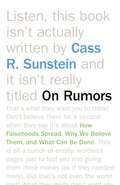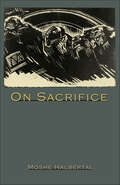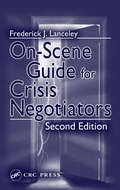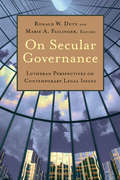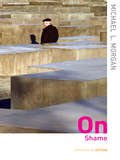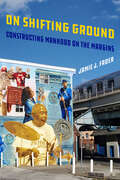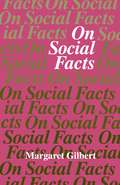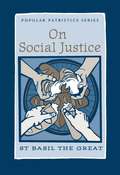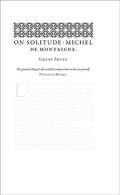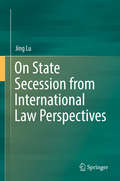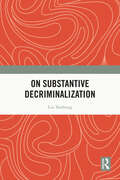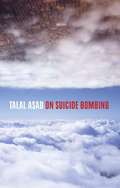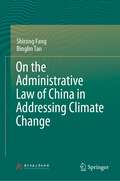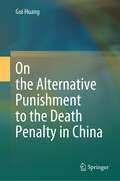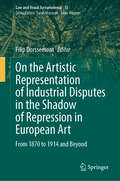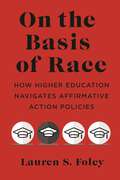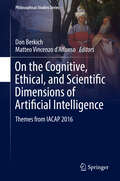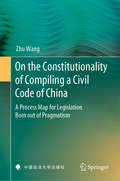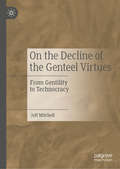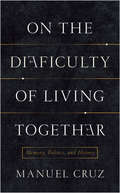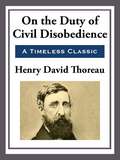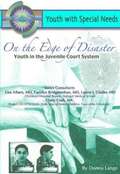- Table View
- List View
On Rumors: How Falsehoods Spread, Why We Believe Them, and What Can Be Done
by Cass R. SunsteinMany of us are being misled. Claiming to know dark secrets about public officials, hidden causes of the current economic situation, and nefarious plans and plots, those who spread rumors know precisely what they are doing. And in the era of social media and the Internet, they know a lot about how to manipulate the mechanics of false rumors—social cascades, group polarization, and biased assimilation. They also know that the presumed correctives—publishing balanced information, issuing corrections, and trusting the marketplace of ideas—do not always work. All of us are vulnerable.In On Rumors, Cass Sunstein uses examples from the real world and from behavioral studies to explain why certain rumors spread like wildfire, what their consequences are, and what we can do to avoid being misled. In a new afterword, he revisits his arguments in light of his time working in the Obama administration.
On Sacrifice
by Moshe HalbertalThe idea and practice of sacrifice play a profound role in religion, ethics, and politics. In this brief book, philosopher Moshe Halbertal explores the meaning and implications of sacrifice, developing a theory of sacrifice as an offering and examining the relationship between sacrifice, ritual, violence, and love. On Sacrifice also looks at the place of self-sacrifice within ethical life and at the complex role of sacrifice as both a noble and destructive political ideal. In the religious domain, Halbertal argues, sacrifice is an offering, a gift given in the context of a hierarchical relationship. As such it is vulnerable to rejection, a trauma at the root of both ritual and violence. An offering is also an ambiguous gesture torn between a genuine expression of gratitude and love and an instrument of exchange, a tension that haunts the practice of sacrifice. In the moral and political domains, sacrifice is tied to the idea of self-transcendence, in which an individual sacrifices his or her self-interest for the sake of higher values and commitments. While self-sacrifice has great potential moral value, it can also be used to justify the most brutal acts. Halbertal attempts to unravel the relationship between self-sacrifice and violence, arguing that misguided self-sacrifice is far more problematic than exaggerated self-love. In his exploration of the positive and negative dimensions of self-sacrifice, Halbertal also addresses the role of past sacrifice in obligating future generations and in creating a bond for political associations, and considers the function of the modern state as a sacrificial community.
On-Scene Guide for Crisis Negotiators
by Frederick J. Lanceley William R. CrandallAccording to author Frederick J. Lanceley one of the world's foremost crisis negotiation authorities negotiators must train and train regularly. For just as the legal field constantly evolves, so does the field of crisis negotiation. The new edition of On-Scene Guide for Crisis Negotiators reflects this fact. A bestseller in its first edition, this
On Secular Governance: Lutheran Perspectives on Contemporary Legal Issues
by Ronald W. Duty Marie A. FailingerThis volume puts forth an unprecedented, distinctive Lutheran take on the intersection of law and religion in our society today. On Secular Governance gathers the collaborative reflections of legal and theological scholars on a range of subjects — women&’s issues, property law and the environment, immigration reform, human trafficking, church-state questions, and more — all addressed from uniquely Lutheran points of view.
On Secular Governance: Lutheran Perspectives on Contemporary Legal Issues
by Ronald W. Duty Marie A. FailingerThis volume puts forth an unprecedented, distinctive Lutheran take on the intersection of law and religion in our society today. On Secular Governance gathers the collaborative reflections of legal and theological scholars on a range of subjects — women’s issues, property law and the environment, immigration reform, human trafficking, church-state questions, and more — all addressed from uniquely Lutheran points of view.
On Settling
by Robert E. GoodinThe hidden value of settlingIn a culture that worships ceaseless striving, "settling" seems like giving up. But is it? On Settling defends the positive value of settling, explaining why this disdained practice is not only more realistic but more useful than an excessive ideal of striving. In fact, the book makes the case that we'd all be lost without settling—and that even to strive, one must first settle.We may admire strivers and love the ideal of striving, but who of us could get through a day without settling? Real people, confronted with a complex problem, simply make do, settling for some resolution that, while almost certainly not the best that one could find by devoting limitless time and attention to the problem, is nonetheless good enough. Robert Goodin explores the dynamics of this process. These involve taking as fixed, for now, things that we reserve the right to reopen later (nothing is fixed for good, although events might always overtake us). We settle on some things in order to concentrate better on others. At the same time we realize we may need to come back later and reconsider those decisions. From settling on and settling for, to settling down and settling in, On Settling explains why settling is useful for planning, creating trust, and strengthening the social fabric—and why settling is different from compromise and resignation.So, the next time you're faced with a thorny problem, just settle. It's no failure.
On Shame (Thinking in Action)
by Michael MorganShame is one of a family of self-conscious emotions that includes embarrassment, guilt, disgrace, and humiliation. On Shame examines this emotion psychologically and philosophically, in order to show how it can be a galvanizing force for moral action against the violence and atrocity that characterize the world we live in. Michael L. Morgan argues that because shame is global in its sense of the self, the moral failures of all groups in which we are a member – including the entire human race – reflect on each person individually. Drawing on historical and current affairs to explore the emotion of shame, as well as films such as Night and Fog, Hotel Rwanda and Life is Beautiful and the work of Primo Levi, Bernard Williams, and Stanley Cavell, Michael Morgan illustrates how moral responsibility can be facilitated by calling upon an emotional reaction that is familiar, complex, and central to our conception of ourselves as individuals and as members of society.
On Shifting Ground: Constructing Manhood on the Margins (Gender and Justice #11)
by Jamie FaderOn Shifting Ground examines how it is to become a man in a place and time defined by economic contraction and carceral expansion. Jamie J. Fader draws on in-depth interviews with a racially diverse sample of Philadelphia's millennial men to analyze the key tensions that organize their lives: isolation versus connectedness, stability versus "drama," hope versus fear, and stigma and shame versus positive, masculine affirmation. In the unfamiliar cultural landscape of contemporary adult masculinity, these men strive to define themselves in terms of what they can accomplish despite negative labels, as well as seeking to avoid "becoming a statistic" in the face of endemic risk.
On Social Facts (International Library Of Philosophy)
by Margaret GilbertAre social groups real in any sense that is independent of the thoughts, actions, and beliefs of the individuals making up the group? Using methods of philosophy to examine such longstanding sociological questions, Margaret Gilbert gives a general characterization of the core phenomena at issue in the domain of human social life. After developing detailed analyses of a number of central everyday concepts of social phenomena--including shared action, a social convention, a group's belief, and a group itself--she proposes that the core social phenomena among human beings are "plural subject" phenomena. In her analyses Gilbert discusses the work of such thinkers as Emile Durkheim, Georg Simmel, Max Weber, and David Lewis. "Gilbert's book aims to ... exhibit some general and structural features of the conceptual scheme in terms of which we think about social groups, collective action, social convention, and shared belief.... [It] offers an important corrective to individualistic thinking in the social sciences...."--Michael Root, Philosophical Review "In this rich and rewarding work, Margaret Gilbert provides a novel and detailed account of our everyday concepts of social collectivity. In so doing she makes a seminal contribution to ... some vexed issues in the philosophy of social science.... [An] intellectually pioneering work."--John D. Greenwood, Social Epistemology
On Social Justice: St. Basil the Great
by Gregory P. Yova C. Paul SchroederSt Basil's homilies on the subject of wealth and poverty, although delivered in the fourth century, remain utterly fresh and contemporary. Whether you possess great wealth or have modest means, at the heart of St Basil's message stands the maxim: Simplify your life, so you have something to share with others. While some patristic texts relate to obscure and highly philosophical questions, St Basil's teachings on social issues are immediately understood and applicable. At a time when vast income disparity and overuse of limited environmental resources are becoming matters of increasing concern, St Basil's message is more relevant now than ever before.
On Solitude
by Michel De MontaigneFor the true bibliophile and design-savvy book lover, here is the next set of Penguin's celebrated Great Ideas series by some of history's most innovative thinkers. Acclaimed for their striking and elegant package, each volume features a unique type-driven design that highlights the bookmaker's art. Offering great literature and great design at great prices, this series is ideal for readers who want to explore and savor the Great Ideas that have shaped our world.
On State Secession from International Law Perspectives
by Jing LuThis book provides essential legal information on state secession in an innovative manner: unlike conventional approaches, which invariably focus on whether there is a right to secession, here the discussion centers on how secessionist conflicts can be effectively resolved. To that end, the book not only reveals the inadequacy of the current international legal framework, but also carefully considers how relevant actors can work to improve the legal system. In short, it argues that secessionists and non-secessionists should conclude an agreement to reconcile their conflicting rights to self-determination, while external actors should do their utmost to ensure the success of these efforts. Positive external involvement requires external actors to refrain from the use of force and to participate more rationally in secessionist conflicts. Given its subject matter, the book will appeal to a broad readership, including students and researchers in international law, international relations and ethnic studies, as well as enthusiasts in these fields.
On Substantive Decriminalization
by Liu YanhongBased on both judicial practice and legal theory, this book examines the phenomenon of low acquittal rates in China from the perspective of substantive law and formulates the theory of substantive decriminalization. In response to this pressing phenomenon, the author critically examines the prevailing tendency in the circle of criminal theory in China, which emphasizes criminalization over decriminalization and harm outcomes over behavioral process. The book attempts to think outside the box of procedural law, an approach that has yielded fruitful results but is limited in understanding decriminalization. Instead, it emphasizes the principle of substantive law, grounded in the modesty and restraint of criminal law and the protection of human rights. From the perspective of criminal class theory and criminal policy, the book proposes the theoretical framework of substantive decriminalization, which provides insight into the whole picture of the decriminalization mechanism of China’s civil law and also has great practical relevance to China’s criminal justice. The title will be an important reference for scholars, students and legal professionals interested in the issue of decriminalization, legal theory and Chinese criminal law.
On Suicide Bombing (The Wellek Library Lectures)
by Talal AsadLike many people in America and around the world, Talal Asad experienced the events of September 11, 2001, largely through the media and the emotional response of others. For many non-Muslims, "the suicide bomber" quickly became the icon of "an Islamic culture of death"-a conceptual leap that struck Asad as problematic. Is there a "religiously-motivated terrorism?" If so, how does it differ from other cruelties? What makes its motivation "religious"? Where does it stand in relation to other forms of collective violence?Drawing on his extensive scholarship in the study of secular and religious traditions as well as his understanding of social, political, and anthropological theory and research, Asad questions Western assumptions regarding death and killing. He scrutinizes the idea of a "clash of civilizations," the claim that "Islamic jihadism" is the essence of modern terror, and the arguments put forward by liberals to justify war in our time. He critically engages with a range of explanations of suicide terrorism, exploring many writers' preoccupation with the motives of perpetrators. In conclusion, Asad examines our emotional response to suicide (including suicide terrorism) and the horror it invokes.On Suicide Bombing is an original and provocative analysis critiquing the work of intellectuals from both the left and the right. Though fighting evil is an old concept, it has found new and disturbing expressions in our contemporary "war on terror." For Asad, it is critical that we remain aware of the forces shaping the discourse surrounding this mode of violence, and by questioning our assumptions about morally good and morally evil ways of killing, he illuminates the fragile contradictions that are a part of our modern subjectivity.
On the Administrative Law of China in Addressing Climate Change
by Shirong Fang Binglin TanThis book puts forward new thinking on how the theory and system of China's administrative law can meet the requirements of the low-carbon era based on the 25-year (1990-2015) development of China’s administrative law in addressing climate change. With the basic content and structure of administrative law as the analytical framework and from the two dimensions of restraining the government's own activities to meet low-carbon requirements and prompting the government to effectively perform the new function of implementing low-carbon regulations, this book systematically studies the due changes and developments of theories and systems such as the basic principles of administrative law, administrative entities, administrative actions, administrative processes and administration liabilities.The purpose of writing this book is to explore and answer the vital role of China’s administrative law in coping with climate change as well as the development of theories and systems of China's administrative law to comply with the new requirements proposed by the government administration in the low-carbon era.This book is the world’s first legal monograph devoted to low-carbon administration in China in the field of administrative law, with novel, prospective and pertinent viewpoints, unique analysis, rich content and detailed information. The study involves cross-disciplinary research in the field of environmental protection, environmental law and administrative law. The book is also a window for the development of China’s administrative law, especially the overall development of low-carbon administration in China.The publication of this book can provide a necessary theoretical basis for follow-up in-depth research on this topic from both China’s and international legal circles as well as related multidisciplinary researchers and provide a substantive reference for worldwide practical circles to make relevant decisions.
On the Alternative Punishment to the Death Penalty in China
by Gui HuangThis book presents a study of alternative penalties to the death penalty in China, aiming to promote theoretical exploration of death penalty reform in China as well as long-term penal reform. Currently, China is endeavouring to control the use of the death penalty and is gradually moving towards its abolition. The factors influencing the choice of the punishment option to replace the death penalty are complex and varied and include the traditional punishment culture, penalty concepts, the political system, the punishment system, public opinion and human rights, etc. Given the differences between China and developed Western democratic states, when we examine these influencing factors, we cannot ignore the culture of the punishment and the special political and legislation system in China. In this light, this work examined and analysed the factors that influence the choice of punishment option to replace the death penalty in this special political system with its clearly Chinese characteristics. Criminal policy and public opinion are two significant and typical factors involving obvious political considerations in China. The former normally reflects and carries out the will of the Government as expressed to the national management; the latter responds to the majority of citizens’ view on the current legal system and it is, to a great extent, the basis for national leadership’s running of the country. Even though life imprisonment without release (hereinafter, LWOR) has been stipulated by the Ninth Amendment for the crime of corruption, it should not be the preferable option as the alternative sanction to the death penalty because it is a kind of cruel torture and violates the constitutional principle of human rights protection. On the contrary, life imprisonment with possibility of release (hereinafter, LWPR) would be an option, but the termination mechanisms for inmates should be set out in accordance with the principle of proportional justice; aggravatedlife imprisonment can be chosen to replace the death penalty in China. In addition, there needs to be improvements made to the relevant criminal systems. By examining China's death penalty reform and long-term imprisonment reform, this book not only explains the methodology of the reform theoretically, but also pays attention to the issues of legislation and judicial practice. This book is of interest to scholars and researchers in the fields of criminal justice, penal reform issues, and crime control in China.
On the Artistic Representation of Industrial Disputes in the Shadow of Repression in European Art: From 1870 to 1914 and Beyond (Law and Visual Jurisprudence #15)
by Filip DorssemontThis book is the first volume on the artistic representation of industrial disputes in European art (from 1870 to 1914) since the catalogue of the landmark exhibition Streik, Realität und Mythos, organized by the Deutsches Historisches Museum (1992). It has been written by a group of scholars who share a keen interest in social history and the history of art, as well as in-depth knowledge of industrial relations and collective labour law. Seeking to transcend a purely western European perspective, the book offers unprecedented insights into artistic production in Poland and Hungary from the 19th century to the communist era. It even goes beyond the European continent, examining the United States and Mexico. The media explored include painting, sculpture, the graphic arts and photography. Further, the book deals with artists great (Carlo Carrà, Walter Crane, James Ensor, Juan Gris, Käthe Kollwitz, Constantin Meunier,Mihály Munkácsy, Théophile-Alexandre Steinlen and Jan Toorop) and small, sometimes even anonymous. The artistic styles range from (social) realism, naturalism and neo-impressionism to futurism and socialist realism. All stages of industrial disputes (from the causes of strikes to their violent suppression) are subjected to iconographical and iconological analysis, combined with perspectives from visual studies, critical art and gender studies. Agricultural workers, miners, construction workers and textile workers fill the scenes. Most of them are subordinate workers; others are (bogus) independent workers and migrant workers. Given its scope, the book will be of interest to (art) historians, labour law scholars, and specialists in industrial relations.
On the Basis of Race: How Higher Education Navigates Affirmative Action Policies
by Lauren S. FoleyHow universities can navigate affirmative action bans to protect diversity in student admissionsDiversity in higher education is under attack as the Supreme Court considers the future of affirmative action, or race-conscious admissions practices, at American colleges and universities. In On the Basis of Race, Lauren S. Foley sheds light on our current crisis, exploring the past, present, and future of this contentious policy.From Brown v. Board of Education in the mid-twentieth century to the current Students for Fair Admissions v. Harvard and University of North Carolina, Chapel Hill, Foley explores how organizations have resisted and complied with public policies regarding race. She examines how admissions officers, who have played an important role in the long fight to protect racial diversity in higher education, work around the law to maintain diversity after affirmative action is banned. Foley takes us behind the curtain of student admissions, shedding light on how multiple universities, including the University of Michigan, have creatively responded to affirmative action bans. On the Basis of Race traces the history of a controversial idea and policy, and provides insight into its uncertain future.
On the Battlefield of Merit: Harvard Law School, the First Century
by Daniel R. CoquilletteHarvard Law School pioneered educational ideas, including professional legal education within a university, Socratic questioning and case analysis, and the admission and training of students based on academic merit. On the Battlefield of Merit offers a candid account of a unique legal institution during its first century of influence.
On the Cognitive, Ethical, and Scientific Dimensions of Artificial Intelligence: Themes from IACAP 2016 (Philosophical Studies Series #134)
by Don Berkich Matteo Vincenzo D’AlfonsoThis edited volume explores the intersection between philosophy and computing. It features work presented at the 2016 annual meeting of the International Association for Computing and Philosophy. The 23 contributions to this volume neatly represent a cross section of 40 papers, four keynote addresses, and eight symposia as they cut across six distinct research agendas. The volume begins with foundational studies in computation and information, epistemology and philosophy of science, and logic. The contributions next examine research into computational aspects of cognition and philosophy of mind. This leads to a look at moral dimensions of man-machine interaction as well as issues of trust, privacy, and justice. This multi-disciplinary or, better yet, a-disciplinary investigation reveals the fruitfulness of erasing distinctions among and boundaries between established academic disciplines. This should come as no surprise. The computational turn itself is a-disciplinary and no former discipline, whether scientific, artistic, or humanistic, has remained unchanged. Rigorous reflection on the nature of these changes opens the door to inquiry into the nature of the world, what constitutes our knowledge of it, and our understanding of our place in it. These investigations are only just beginning. The contributions to this volume make this clear: many encourage further research and end with open questions.
On the Constitutionality of Compiling a Civil Code of China: A Process Map for Legislation Born out of Pragmatism
by Zhu WangThis book explains the urgent necessity to compile a Civil Code and calls for constitutional awareness in compiling that Civil Code, highlighting the need for it to be done in a democratic and scientific manner. It advocates “Pragmatic Methods” as a new approach to compiling a Civil Code of China and shares the author’s thoughts on the constitutionality of compiling a Civil Code, explains the object that is to be judged in terms of its constitutionality, and the constitutionality of legal interpretation, of legislative procedures and of legal application. The book also illustrates the author’s “mode of the codifying of non-basic laws” for compiling a Civil Code, and includes a detailed discussion on compiling a Civil Code to reveal how many valid laws there are China – a matter that is of vital importance to the compilation of the Civil Code.The Appendix includes statistics on the number of civil cases classified according to causes of actions, based on “Judicial Opinions of China” website, which is the first step of the author’s plan to investigate civil customs reflected in judgment documents with the help of big-data analytical methods.
On the Decline of the Genteel Virtues: From Gentility to Technocracy
by Jeff MitchellThis innovative book proposes that what we think of as “moral conscience” is essentially the exercise of reflective judgment on the goods and ends arising in interpersonal relations, and that such judgment constitutes a form of taste. Through an historical survey Mitchell shows that the constant pendant to taste was an educational and cultural ideal, namely, that of the gentleman, whether he was an ancient Greek citizen-soldier, Roman magistrate, Confucian scholar-bureaucrat, Renaissance courtier, or Victorian grandee. Mitchell argues that it was neither an ethical doctrine nor methodology that provided the high cultures with moral and political leadership, but rather an elite social order. While the gentry in the traditional sense no longer exists, it nevertheless made significant historical contributions, and insofar as we are concerned to understand the present state of human affairs, we need to grasp the nature and import of said contributions.
On the Difficulty of Living Together: Memory, Politics, and History (New Directions in Critical Theory #21)
by Manuel CruzIn On the Difficulty of Living Together, Manuel Cruz launches a nuanced study of memory and forgetting, defining their forms and uses, political meanings, and social and historical implications. Memory is not an intrinsically positive phenomenon, he argues, but an impressionable and malleable one, used to advance a variety of agendas. Cruz focuses on five memory models: that which is inherently valuable, that which legitimizes the present, that which supports retributive justice, that which is essential to mourning, and that which elicits renunciation or revelation. His methodical approach makes sense of memory's positive and negative effects, its contradictions, and its tensions. Cruz shows us that remembering is not necessarily an end in itself, nor is it a supreme value, immune to external influence. The exercise of memory guarantees nothing, though many insist it is a progressive act preventing the repetition of past mistakes. Tying the making of memory to the movements of history, Cruz prioritizes memory's political dimensions over its philosophical aspects and helps us remember its myriad uses.
On the Duty of Civil Disobedience
by Henry David ThoreauCivil Disobedience argues that citizens should not permit their governments to overrule their consciences, and that they have a duty to avoid allowing their acquiescence to enable the government to make them the agents of injustice. Thoreau was motivated in part by his disgust with slavery and the Mexican-American War, but the sentiments he expresses here are just as pertinent today as when they were first written. A true American classic.
On the Edge of Disaster: Youth in the Criminal Justice System (Youth With Special Needs)
by Donna LangeFrom the Book jacket: Jeremy and I walked to the edge of the school property. Jeremy crawled behind some bushes and held up a full-size skeleton. "I took it from the science room. We can pull a great prank on someone. Who should we scare?" Jeremy asked. I shrugged. He looked disappointed, put down the skeleton, and looked around for something else to do. He scooped up a rock and pointed at a small window in the door of the school. "Let's have a contest, see who can break it first." The next thing I knew, the glass had shattered, the janitor was yelling, and we were running. Then I heard a deep voice. "Boys, come on out. Put your hands over your heads and kneel on the ground." Jeremy and I crawled out from behind the bushes, knelt on the ground, and lifted our hands. Two police officers towered over us. What happens when an adolescent commits an offense? Is it always the beginning of a criminal career, or is there hope for that individual to learn from the experience and make better choices in the future? How will the young person be treated, and what type of punishment might he or she be given? On the Edge of Disaster: Youth in the Juvenile Court System explains various procedures, processes, and people in the juvenile court system. In this book, you will learn what happens when young people commit crimes and how they can get back on the right side of the law.
